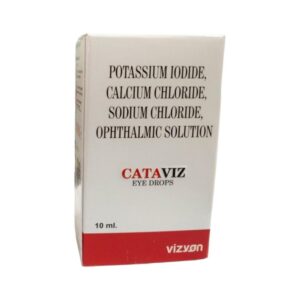POTASSIUM CHLORIDE + CALCIUM CHLORIDE + OPHTHALMIC OINTMENT
Potassium Chloride: Potassium Chloride is a medication commonly used to treat or prevent low levels of potassium in the blood, a condition known as hypokalemia. It is also prescribed to patients who are on diuretic therapy or have conditions that cause potassium loss, such as severe vomiting or diarrhea.
The main mechanism of action of Potassium Chloride is to replenish and maintain adequate potassium levels in the body. Potassium is essential for the proper functioning of various bodily processes, including nerve transmission, muscle contraction, and maintaining a regular heart rhythm.
The dosage of Potassium Chloride varies depending on the individual’s needs and the severity of the potassium deficiency. It is available in different forms including tablets, capsules, and liquid solutions. The recommended dose for adults is usually around 20-100 milliequivalents (mEq) of potassium per day, which can be divided into multiple doses throughout the day. However, the exact dosage should be determined by a healthcare professional.
Like any medication, Potassium Chloride may cause some side effects. The most common side effects include gastrointestinal symptoms such as nausea, vomiting, diarrhea, and abdominal discomfort. Other potential side effects may include hyperkalemia (high levels of potassium in the blood), irregular heartbeat, and allergic reactions such as rash or itching. In rare cases, high doses or rapid infusion of Potassium Chloride can lead to serious complications, such as cardiac arrest or even death. Therefore, it is crucial to closely monitor potassium levels and follow the prescribed dosage and administration instructions.
Calcium Chloride: Drug: Calcium Chloride
Use: Calcium chloride is a medication used to treat conditions caused by low calcium levels in the body, such as hypocalcemia or calcium channel blocker overdose. It can also be used to supplement calcium in patients who have difficulty absorbing calcium from their diet or who have low levels of calcium due to chronic kidney disease.
Mechanism of Action: Calcium chloride works by increasing the levels of calcium in the blood. Calcium is an essential mineral that plays a crucial role in various bodily functions, including muscle contraction, nerve function, and blood clotting. By supplementing calcium, calcium chloride helps restore normal levels in the body.
Dose: The dosage of calcium chloride varies depending on the patient’s age, weight, and the specific condition being treated. It is typically administered as an injection or infusion and is only available with a prescription. The dose should be determined by a healthcare professional and administered under their supervision.
Side Effects: Like any medication, calcium chloride can cause side effects. Common side effects may include nausea, vomiting, stomach upset, constipation, and increased thirst. In rare cases, it may cause an allergic reaction, which can manifest as rash, itching, swelling, dizziness, or difficulty breathing. If any severe or persistent side effects occur, it is essential to seek immediate medical attention.
Please note that this is a general description of calcium chloride and should not be used as a substitute for medical advice. It is important to consult a healthcare professional for personalized information and guidance on the use of calcium chloride.
Ophthalmic Ointment: Ophthalmic ointment is a medication that is specifically formulated for use in the eyes. It is used to treat various eye conditions, including infections, inflammation, and dryness.
The mechanism of action of ophthalmic ointments varies depending on the specific medication being used. However, in general, these ointments work by either killing or inhibiting the growth of bacteria, reducing inflammation, or providing lubrication and moisture to the eyes.
The dose and frequency of use of ophthalmic ointment will depend on the specific medication and the condition being treated. It is important to follow the instructions provided by your healthcare professional or the product label. Ophthalmic ointments are usually applied to the lower eyelid or within the conjunctival sac of the eye, and they should not be directly applied to the cornea.
Like any medication, ophthalmic ointments can have side effects. Common side effects may include temporary eye stinging or burning upon application. Some ointments may cause blurred vision or worsen existing vision problems. In rare cases, individuals may experience allergic reactions, such as itching, swelling, or redness of the eyes or eyelids. If you experience any severe or persistent side effects, it is important to consult a healthcare professional.

